So, normally at about this time of year our good friends over at Sentinel Hill Press put together a blog posting which summarises all the nifty products that were released for Call of Cthulhu in the previous year. Because I know that the Sentinel folks are really, REALLY busy with a combination of real world things (a new homonculous) and finishing off their amazing Arkham Gazette Kickstarter, I’ve decided to step in to write up this year’s write up — a “those were the tentacles that were” kind of thing. I hope WinstonP doesn’t mind 🙂
Compared to the last few years, 2016 was a quiet-ish year for new Call of Cthulhu releases. Depending on how you count it, there were between 10 and 12 new book titles released for the game compared to around 16 in 2015. Of course, that number does include two pretty important titles — the Call of Cthulhu 7th Edition rules (which were technically published in PDF form late in 2015, even though most people didn’t get hard copies until late 2016) and the long-awaited Pulp Cthulhu.

There is no denying that 2016 was a year dominated by Kickstarter-delivered titles … in fact every single title that was produced for Call of Cthulhu came out as the result of a Kickstarter, or as an add-on to a Kickstarter. Here’s a breakdown of the books released in 2016, grouped by publisher.
Chaosium
Chaosium had a big year in 2016, mostly due to the (much elongated) delivery of it’s anticipated 7th Edition Call of Cthulhu rules. Although versions of the final layouts have been kicking around for a year or so, it has been great to see most backers of their 2013 Kickstarter campaign get their books. The Kickstarter isn’t entirely finished yet, but it’s close to being done — which must be a big relief to Chaosium (who have earned the unenviable epithet “The Company That Almost Kickstarted Itself To Death”).

The other big, BIG release for Chaosium in 2016 was Pulp Cthulhu. Those of you who have followed the game for a while will already be aware that Pulp Cthulhu has been an “upcoming title” for Call of Cthulhu for a decade or more. The version that finally came out in 2016 probably has very little in common with the book that was originally announced in the mid 2000s, having been extensively “reworked” by Mike Mason and others. It is quite a significant release for Call of Cthulhu, though, since it introduces a rather different “mode” of play — much less focussed on investigation, and much more on two-fisted, Indiana Jones-style, action. While other Lovecraftian games have incorporated “pulp” sensibilities (in particular Trail of Cthulhu), few if any have embraced this mode with as much gusto.
In addition to these two big rules-related books, Chaosium released a couple of books which brought new scenarios. Doors To Darkness is a book of 7th Edition scenarios which is specifically targetted at beginning Keepers and players, with the book providing more-than-typical guidance text to help folks who are still learning the game. Interestingly, this book was briefly released in limited numbers at NecronomiCon 2015 in a black and white softcover format but Chaosium subsequently made the decision to abandon that layout in favour of a new, full-colour hardcover treatment to better fit in with the more lavish presentation that premiered with the 7th Edition books and Pulp Cthulhu. Chaosium Creative Director Jeff Richard has mentioned at convention panels that this high production value will be standard for all future books produced by the company.
The other Chaosium release for 2016 was a more slim tome — a Free RPG Day scenario by Sandy Petersen called “The Derelict”. This short, modern-day title was significant for a couple of reasons. Firstly, it was Chaosium’s first Free RPG Day book; secondly it was the first newly published Call of Cthulhu material in 20 years written by the original creator of the game.

Another interesting first for Chaosium in 2016 was the establishment of their “Organised Play” programme via the “Cult of Chaos”, a free-to-join association of Keepers that volunteers to run Call of Cthulhu either at public events (e.g., conventions) or for their own home-grown groups. Chaosium’s first “Organised Play” event was a six-part classic-era campaign called “A Time to Harvest” set around Miskatonic Universtity and the backwaters of Vermont. This campaign was released in parts (one chapter per month throughout mid-2016) to Cult of Chaos keepers for free. There are plans to revise the campaign based on feedback from those Keepers and one day release this campaign as a proper Chaosium title.
Licensees
Moving away from Chaosium-land, 2016 was also a big year for several of the Call of Cthulhu licensees. Foremost among those is Cubicle 7, who put out three books as part of two different Kickstarter campaigns. The first of these was World War Cthulhu: London, a book detailing the home front during World War II (as part of Cubicle 7’s WW2 setting first described in 2013’s World War Cthulhu: Their Darkest Hour). The WWC: London book was originally created as a stretch goal to the 2013 Cthulhu Britannica London Kickstarter, and is the last piece of that campaign to be delivered.

An entirely different Kickstarter campaign by Cubicle 7 saw the release of an exciting new campaign setting for Call of Cthulhu — the shadowy world of 1970s Cold War espionage. Two different books were released as part of this campaign in 2016. They were World War Cthulhu: Cold War and the Section 46 Operations Manual. Both books look great and the Cold War looks like a really interesting, if somewhat grim, setting for Cthulhu gaming — one I am certainly looking forward to reading (especially if it maintains the uniformly high standard Cubicle 7 has shown of late).
Speaking of World War 2 setting, 2016 also saw the final books delivered for Modiphius’ rather ambitious Kickstarter for the Achtung! Cthulhu line of products. Ever since this campaign was run in 2013 there has been a steady stream of sourcebooks and hardback campaigns published as well as some rather strange cross-over products with other game systems. Two of the latter titles were the stragglers that finally saw the light of day in 2016 — Elder Godlike (a cross-over with Greg Stolze’s superhero RPG Godlike) and Secrets of the Dust (a cross-over with Paolo Parente’s DUST universe).
Golden Goblin Press has established somewhat of a reputation for itself in recent years with timely fulfilment of Kickstarter campaigns. In 2016 they delivered on their third such game-related Kickstarter, Tales of the Caribbean. This book includes seven 1920s-era scenarios spread over the diverse islands of the Caribbean.
Goodman Games also released another volume of its popular Age of Cthulhu line: The Lost Expedition. As with the previous entry in this series, this (ninth) book in the AoC line was funded via a Kickstarter.

Last, but certainly not least, among the Call of Cthulhu licensees active in 2016 is the new-kid-on-the-block Stygian Press (run by Stephanie McAlea). This new publisher released its first (Kickstarter-funded) book, The Things We Leave Behind, which aims to present a grim and grown-up version of modern-day Call of Cthulhu. I would have to say that I was blown away by the quality of the writing in this book — these are truly great, if somewhat dark and twisted, scenarios … certainly a lot more embedded in the horrors of 21st century “modern” life than almost anything that’s been published before. If I had to pick one “best book” for the year, this one would certainly be a serious contender.
Magazines
Generally, 2016 was a pretty lean year for Call of Cthulhu content in Magazines — once again the stalwart “Unspeakable Oath” remained silent, with no releases.
The big exception to this resounding silence is the back-issues of the Arkham Gazette released by Sentinel Hill. In 2014, Sentinel ran a highly successful Kickstarter to create the third issue of its Lovecraft Country magazine/sourcebook, devoted to an in-depth study of witchcraft in Arkham and elsewhere. The PDF and print versions of this magazine issue were all delivered in 2015 … but stretch goals of the original Kickstarter promised upgrades and reissues of older (free PDF-only) issues of the magazine. In 2016 two of these emerged — Issue #0 (Aylesbury Pike) and Issue #1 (Arkham), both in PDF and softcover Print-On-Demand.
Cthulhu Reborn
Finally, I can’t write a wrap-up of 2016 without sparing a few sentences to flog Convicts & Cthulhu, our very own big release for 2016. This setting book, covering Lovecraftian horrors in the early penal settlements of Australia, has been extremely well-received and has sold far, far in excess of our wildest dreams. Geoff Gillan — my partner in convict-ness has, subsequent to the release of the main (96-page softcover and PDF) book, also written three small supplements which we have released for free. All of those goodies are available right now over on RPGNow.








 Even after 30 years of published sourcebooks, gamers still retain the same level of curiosity about the expanse of the Call of Cthulhu universe.
Even after 30 years of published sourcebooks, gamers still retain the same level of curiosity about the expanse of the Call of Cthulhu universe.







 Pegasus have put the publication of original (i.e., non-translated) Cthulhu material serious on steriods … to the extent that there is now a vast array of products and even a successful German-language magazine devoted to Cthulhuoid gaming.
Pegasus have put the publication of original (i.e., non-translated) Cthulhu material serious on steriods … to the extent that there is now a vast array of products and even a successful German-language magazine devoted to Cthulhuoid gaming.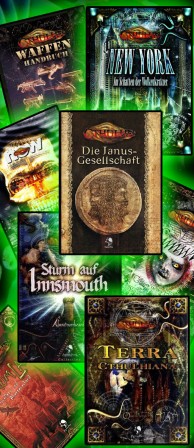

 Heiko: The greatest “Plus” that Call of Cthulhu has maintained over the years is the continual backwards-compatibility of its published material. Using the current rules, you can easily still play stuff from decades and decades ago … What other game can you say that about? I think of this as an “ongoing-milestone”. Individual milestones were the great campaigns (
Heiko: The greatest “Plus” that Call of Cthulhu has maintained over the years is the continual backwards-compatibility of its published material. Using the current rules, you can easily still play stuff from decades and decades ago … What other game can you say that about? I think of this as an “ongoing-milestone”. Individual milestones were the great campaigns (






 That said, the PDF supplement is the ideal means of testing the waters, or of getting one good idea or adventure out there. It’s not at all unlikely that I might provide some more Bookhounds-centric or at least very Bookhounds-useful material, for example, in an upcoming issue of
That said, the PDF supplement is the ideal means of testing the waters, or of getting one good idea or adventure out there. It’s not at all unlikely that I might provide some more Bookhounds-centric or at least very Bookhounds-useful material, for example, in an upcoming issue of  It could use a presentation makeover (remember how very lovely the d20 Call of Cthulhu book was?), but other than that I don’t have any good ideas about how to make such things more attractive to new gamers: I suspect the answer is “a very expensive targeted marketing campaign.”
It could use a presentation makeover (remember how very lovely the d20 Call of Cthulhu book was?), but other than that I don’t have any good ideas about how to make such things more attractive to new gamers: I suspect the answer is “a very expensive targeted marketing campaign.” Per your last question, some of the biggest names —
Per your last question, some of the biggest names — 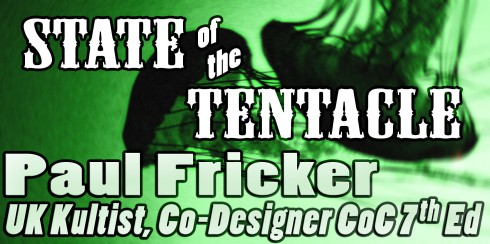
 Hot on the heels of our
Hot on the heels of our 
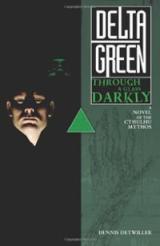
 Paul: Even back in the pre-internet-1980s there was a circulation of
Paul: Even back in the pre-internet-1980s there was a circulation of 
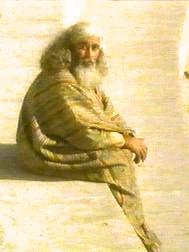


 Mike Mason is the co-writer of Call of Cthulhu 7th Edition Rulebook and co-writer of the (also upcoming) Call of Cthulhu Investigator’s Handbook. Previously, Mike was the developer, editor and co-author of Black Industries (now FFG) 40K RPG
Mike Mason is the co-writer of Call of Cthulhu 7th Edition Rulebook and co-writer of the (also upcoming) Call of Cthulhu Investigator’s Handbook. Previously, Mike was the developer, editor and co-author of Black Industries (now FFG) 40K RPG  Mike has also worked for Games Workshop, managing the annual Games Day & Golden Demon show, running numerous 40K and Warhammer tournaments, as well as setting up a UK gaming community programme to support gaming clubs in schools, colleges and libraries. In his spare time he also set up and ran the UK’s Kult of Keepers; a cadre of writers and keepers who organised and ran numerous Call of Cthulhu games across UK and German RPG conventions.
Mike has also worked for Games Workshop, managing the annual Games Day & Golden Demon show, running numerous 40K and Warhammer tournaments, as well as setting up a UK gaming community programme to support gaming clubs in schools, colleges and libraries. In his spare time he also set up and ran the UK’s Kult of Keepers; a cadre of writers and keepers who organised and ran numerous Call of Cthulhu games across UK and German RPG conventions.
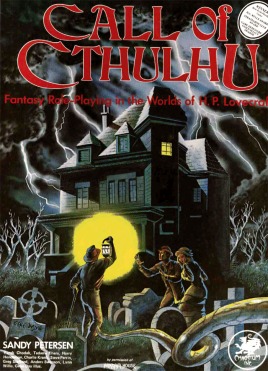


 The key challenge has always been ensuring games are accessible to new players. Some people have the ‘RPG gene’, some don’t. Just like some have the ‘bird watching gene’ and some don’t. We have to ensure that those with the gaming gene have the opportunity to play a game and discover for themselves that they like it. Making sure RPGs are available and accessible is important. That’s often why gaming clubs are important as they provide a way-in for new and returning gamers. The Internet is obviously a big help too – as are podcasts like
The key challenge has always been ensuring games are accessible to new players. Some people have the ‘RPG gene’, some don’t. Just like some have the ‘bird watching gene’ and some don’t. We have to ensure that those with the gaming gene have the opportunity to play a game and discover for themselves that they like it. Making sure RPGs are available and accessible is important. That’s often why gaming clubs are important as they provide a way-in for new and returning gamers. The Internet is obviously a big help too – as are podcasts like  Mike: One of the things I was pleased to write was the chapter on investigator organisation in the 7th edition Investigator’s Handbook. We have a limited number of these existing, Delta Green being the most famous. In the chapter I wanted to open up the possibilities for every group to feel that it was ok for them to create their own organisation, or at least give them a range of ideas that they could build on. Thus, in the chapter, we have all manner of organisations that the investigators could be a part of, including a travelling circus, the R&D wing of a multi-national business, an esoteric order, a collection of ex-military comrades, and many others. I think this opens out the possibilities and I’d love to see what different gaming groups do with these ideas. In time, I could envision some cool campaigns to stem from these ideas, and I’d love to see more published materials along these lines.
Mike: One of the things I was pleased to write was the chapter on investigator organisation in the 7th edition Investigator’s Handbook. We have a limited number of these existing, Delta Green being the most famous. In the chapter I wanted to open up the possibilities for every group to feel that it was ok for them to create their own organisation, or at least give them a range of ideas that they could build on. Thus, in the chapter, we have all manner of organisations that the investigators could be a part of, including a travelling circus, the R&D wing of a multi-national business, an esoteric order, a collection of ex-military comrades, and many others. I think this opens out the possibilities and I’d love to see what different gaming groups do with these ideas. In time, I could envision some cool campaigns to stem from these ideas, and I’d love to see more published materials along these lines.
 Mike: In five years time I imagine all the initial fuss over 7th edition will be long forgotten and people will just be continuing to play Call of Cthulhu. An explosion of cool settings, new scenarios and a couple of new big campaigns will be good. An investigator generator should hopefully be available for PC, Mac, iPad, iPhone and Android by then too (well, at least I hope so!).
Mike: In five years time I imagine all the initial fuss over 7th edition will be long forgotten and people will just be continuing to play Call of Cthulhu. An explosion of cool settings, new scenarios and a couple of new big campaigns will be good. An investigator generator should hopefully be available for PC, Mac, iPad, iPhone and Android by then too (well, at least I hope so!).

 In the 1980s Christian published a well regarded French-language RPG magazine called
In the 1980s Christian published a well regarded French-language RPG magazine called  France has a strange relationship with fantasy, and an even stranger relationship with Lovecraft. Even though
France has a strange relationship with fantasy, and an even stranger relationship with Lovecraft. Even though 



 and then new French creations, books for Keepers as well as new scenarios ( from Tristan Lhomme, long-time writer of shorter scenarios for Casus Belli, who took the opportunity given him of writing longer stuff). Sans Detour has prospered, its long term bet of producing beautiful well laid-out supplements proving a great success. I don’t know how they do it, I don’t know what they’ve sacrificed to become such a success while churning out beautiful well-produced books at reasonable prices, but they seem to thrive. At the same time,
and then new French creations, books for Keepers as well as new scenarios ( from Tristan Lhomme, long-time writer of shorter scenarios for Casus Belli, who took the opportunity given him of writing longer stuff). Sans Detour has prospered, its long term bet of producing beautiful well laid-out supplements proving a great success. I don’t know how they do it, I don’t know what they’ve sacrificed to become such a success while churning out beautiful well-produced books at reasonable prices, but they seem to thrive. At the same time, 
 Chaosium’s decision to do a «quick and dirty» has produced some gems (Oscar Rios’s haunting
Chaosium’s decision to do a «quick and dirty» has produced some gems (Oscar Rios’s haunting  Christian: I find that each line reflects in a way the world-view of its seminal authors. Herber and Di Tillio and Ross and Willis crafted the Chaosium line of scenarios: whether they are globe spanning adventures or backwards Lovecraft Country one-shots, they have a certain feel, in which the humanity of the PCs and NPCs, the care for the fate of individuals, are paramount. The
Christian: I find that each line reflects in a way the world-view of its seminal authors. Herber and Di Tillio and Ross and Willis crafted the Chaosium line of scenarios: whether they are globe spanning adventures or backwards Lovecraft Country one-shots, they have a certain feel, in which the humanity of the PCs and NPCs, the care for the fate of individuals, are paramount. The 
 I was thrilled when Greg Stoltze and Dennis Detwiller started tu use a Pledge system to get new work in print, and now Kickstarter seems like a very promising venture for the future, but I’m a bit wary of becoming too complacent about KS and having authors and companies compete for donors only to take ages to deliver the final product. I think it is very important to give pledgers a reasonable timing for «when will that f$$$****ing book/game come out?» and I find it is not always the case. KS is a contract, of sorts, and it’s very important not to mess with pledger’s expectations.
I was thrilled when Greg Stoltze and Dennis Detwiller started tu use a Pledge system to get new work in print, and now Kickstarter seems like a very promising venture for the future, but I’m a bit wary of becoming too complacent about KS and having authors and companies compete for donors only to take ages to deliver the final product. I think it is very important to give pledgers a reasonable timing for «when will that f$$$****ing book/game come out?» and I find it is not always the case. KS is a contract, of sorts, and it’s very important not to mess with pledger’s expectations. Christian: I think what is missing at the moment is an incentive to draw more new players into the game. Obviously a Del Toro “
Christian: I think what is missing at the moment is an incentive to draw more new players into the game. Obviously a Del Toro “ Christian: I hope to see more new companies, I hope to see work from fantastic authors like Oscar Rios ans David Conyers and Kevin Ross and others actually getting into print. I mean, I’m not going to live eternally, and I won’t find much use if my heirs slip a copy of Kevin Ross’s Colonial era supplements in my coffin ( maybe the ghouls will…). I hope that as we grow older, I can still play with my friends, even if we drift apart geographically, by using the Internet. My current group has four players around a table near Paris, and a friend who has moved near Brussels and plays through Skype. I tend to forget he’s not there physically. And I guess this is a great way to connect Keepers and players as new programs help us to transfer the rpg experience through the Internet.
Christian: I hope to see more new companies, I hope to see work from fantastic authors like Oscar Rios ans David Conyers and Kevin Ross and others actually getting into print. I mean, I’m not going to live eternally, and I won’t find much use if my heirs slip a copy of Kevin Ross’s Colonial era supplements in my coffin ( maybe the ghouls will…). I hope that as we grow older, I can still play with my friends, even if we drift apart geographically, by using the Internet. My current group has four players around a table near Paris, and a friend who has moved near Brussels and plays through Skype. I tend to forget he’s not there physically. And I guess this is a great way to connect Keepers and players as new programs help us to transfer the rpg experience through the Internet.

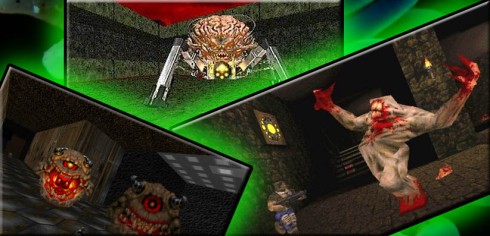








 As a result, we are scattered far and wide, and it is physically harder for us to get together for our Lovecraft gaming fix. Technology is just now able to solve this problem, and I’m happy about it. Now old friends who live hundreds, even thousands of miles away, will be able to get together to play games.
As a result, we are scattered far and wide, and it is physically harder for us to get together for our Lovecraft gaming fix. Technology is just now able to solve this problem, and I’m happy about it. Now old friends who live hundreds, even thousands of miles away, will be able to get together to play games.

 Scott is a collector of jack o’lanterns and bigfoot movies, and works extensively to restore his old Colonial home (“The House of Secrets”) to its former original period splendour. Scott’s blog, “Whispers from the House of Secrets,” where he blathers on about writing, rails against the mundane world, waxes nostalgic and otherwise makes noise can be found at:
Scott is a collector of jack o’lanterns and bigfoot movies, and works extensively to restore his old Colonial home (“The House of Secrets”) to its former original period splendour. Scott’s blog, “Whispers from the House of Secrets,” where he blathers on about writing, rails against the mundane world, waxes nostalgic and otherwise makes noise can be found at:  [indeed “Convergence”, the scenario which introduced the idea of Delta Green was published in
[indeed “Convergence”, the scenario which introduced the idea of Delta Green was published in 
 I think the late Keith Herber’s
I think the late Keith Herber’s  I think the best way to do something like that is to release your new setting book and immediately follow it up with a book of scenarios. If that proves successful follow it with a campaign and perhaps a companion to gather and add new rules, occupations, monsters, villains, etc. to the particular setting. Chaosium, for example, has never really done much to support either the Dreamlands setting (although ironically, that book has been reprinted a number of times and had several updated editions) or their Gaslight era book (or Invictus or Dark Ages….). Fellow-dinosaur and Elder Statesman of CoC, Kevin Ross wrote, assembled and edited a series of Colonial America CoC setting books (and a Western CoC line, incidentally) for a licensee which includes the
I think the best way to do something like that is to release your new setting book and immediately follow it up with a book of scenarios. If that proves successful follow it with a campaign and perhaps a companion to gather and add new rules, occupations, monsters, villains, etc. to the particular setting. Chaosium, for example, has never really done much to support either the Dreamlands setting (although ironically, that book has been reprinted a number of times and had several updated editions) or their Gaslight era book (or Invictus or Dark Ages….). Fellow-dinosaur and Elder Statesman of CoC, Kevin Ross wrote, assembled and edited a series of Colonial America CoC setting books (and a Western CoC line, incidentally) for a licensee which includes the 
 Where in the 1970’s and 1980’s finding Lovecraftian/Mythos material was like a glorious and elusive treasure hunt, today one just has to browse through the local comic or book shop to find numerous mentions of HPL and his cosmic sprattlings. And the explosive bloom of Mythos anthologies, collections and novels is mind-numbing; I clearly remember a time not so very long ago when most book and magazine submission guidelines specifically said “NO LOVECRAFT/CTHULHU STORIES.” The day was when you would mention “Lovecraft” or “Cthulhu” and people would look at you oddly and you would grin knowingly, but now you can’t swing a cat without hitting some self-proclaimed Lovecraft fan (or worse, “Lovecraft scholar”) or Mythos aficionado. It’s crazy! And not in the good, drooling from mind-blasted insanity way! Maybe I’m just an old curmudgeon unhappy that his special little private club has opened its doors to the public? It just seems that the wider the popularity spreads the more watered down and inane the whole thing gets.
Where in the 1970’s and 1980’s finding Lovecraftian/Mythos material was like a glorious and elusive treasure hunt, today one just has to browse through the local comic or book shop to find numerous mentions of HPL and his cosmic sprattlings. And the explosive bloom of Mythos anthologies, collections and novels is mind-numbing; I clearly remember a time not so very long ago when most book and magazine submission guidelines specifically said “NO LOVECRAFT/CTHULHU STORIES.” The day was when you would mention “Lovecraft” or “Cthulhu” and people would look at you oddly and you would grin knowingly, but now you can’t swing a cat without hitting some self-proclaimed Lovecraft fan (or worse, “Lovecraft scholar”) or Mythos aficionado. It’s crazy! And not in the good, drooling from mind-blasted insanity way! Maybe I’m just an old curmudgeon unhappy that his special little private club has opened its doors to the public? It just seems that the wider the popularity spreads the more watered down and inane the whole thing gets. So, with the newfound popularity of all things Lovecraft comes a melding of modern ideas and technology into the Mythos, and we’re seeing
So, with the newfound popularity of all things Lovecraft comes a melding of modern ideas and technology into the Mythos, and we’re seeing 
 Scott: As I mentioned elsewhere, I think product lines should be developed and supported. I would love to see more
Scott: As I mentioned elsewhere, I think product lines should be developed and supported. I would love to see more  Something I would also love to see (and to be a part of) would be CoC source material for other author’s worlds.
Something I would also love to see (and to be a part of) would be CoC source material for other author’s worlds. 
 Scott: The hobby itself I expect to have shrunken in five years. It’s a sad truth that as technology advances table top RPGs just aren’t as popular as computer and video games. Dead tree publishing in general is not in the best of health: “print is dead” and all of that twaddle. As for CoC, unless someone does something monumentally stupid or there’s some cataclysmic shake-up, I don’t see as it will be much different than it is today. The game has survived pretty much unchanged since 1981, so barring a tragically radical new edition, I don’t foresee any great changes.
Scott: The hobby itself I expect to have shrunken in five years. It’s a sad truth that as technology advances table top RPGs just aren’t as popular as computer and video games. Dead tree publishing in general is not in the best of health: “print is dead” and all of that twaddle. As for CoC, unless someone does something monumentally stupid or there’s some cataclysmic shake-up, I don’t see as it will be much different than it is today. The game has survived pretty much unchanged since 1981, so barring a tragically radical new edition, I don’t foresee any great changes.

 Gareth: Pregenerated or partially pregenerated characters are an easy solution. Have a set of Lovecraftian investigator archetypes – the Antiquarian, the Private Detective, the Dilettante and so on – with most of their stats and skills precalculated. Let the player spend a few points on skills to customise the character, maybe have a bunch of background hooks and character quirks to pick from, and off you go.
Gareth: Pregenerated or partially pregenerated characters are an easy solution. Have a set of Lovecraftian investigator archetypes – the Antiquarian, the Private Detective, the Dilettante and so on – with most of their stats and skills precalculated. Let the player spend a few points on skills to customise the character, maybe have a bunch of background hooks and character quirks to pick from, and off you go.